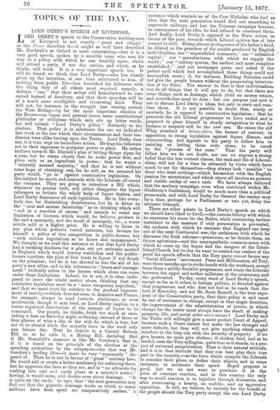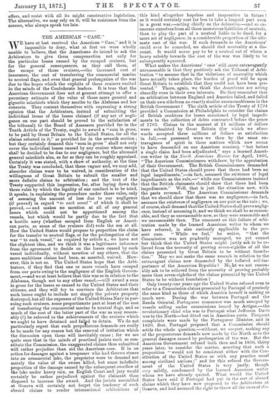TOPICS OF THE DAY.
LORD DERBY'S SPEECH AT LIVERPOOL.
AORD DERBY'S speech to the Conservative working-men sentence which reminds us of the Czar Nicholas, who had an idea that the next generation would find out something to supersede railways, and lost the Crimean campaign because, in consequence of his idea, he had refused to construct them. And finally, Lord Derby is opposed to the State action in favour of the poor, towards which Liberal opinion has of late seemed to drift. Rising almost to eloquence of his father's kind, he dilated on the grandeur of the results produced by English individualism, our "unparalleled commerce," our "unlimited capital ;" our "manufactures, with which we supply the- world ;" our "railway system, the earliest and most complete established ;" and our newspaper press, and asked if the potent spell which had accomplished these things could not accomplish more ; if, for instance, Building Societies could not give the people houses without the pauperizing interven- tion of the State. The answer to that is that individualism can do all things that it will pay to do, but that there are some things, such as drainage, which yield no money return, and nevertheless must be done ; but our purpose just now is not to discuss Lord Derby's ideas, but only to state and com- bine them. It is not possible to doubt that, wisely or unwisely, he is opposed to constructive legislation ; that he perceives the old Liberal programme to have ended, and is prepared to place himself in steady antagonism to what he foresees or suspects will be the new one. He raises the old Whig standard of laissez-faire, the banner of content, in opposition to strong legislation against liquor, disease, and overcrowding, and appeals to his party to follow him in insisting on letting those evils alone, to be cured by the "process of the suns." That his party will follow him we do not doubt, nor can we express a strong belief that the less content classes, the rank and file of Liberal- alism, will not for a time be attracted by views which have much to say for themselves—they always look " sensible " ta those who want nothing—which harmonize with the English passion for unrestraint, and which above all involve no present and visible outlay of one's cash. We have always believed that the sanitary campaign, even when restricted within Mr. Gladstone's limitations, would be much more than a political promenade, and with Lord Derby for General the enemy may for a time, perhaps for a Parliament or two yet, delay the ultimate triumph.
There are other points in Lord Derby's speech on which we should have liked to dwell,—the curious felicity with which he expresses his scorn for the Ballot, while renouncing farther resistance to the measure if only personation is prevented, the coolness with which he assumes that England can keep out of the next Continental war, the unfairness with which he discusses the Irish reforms—premiums, as he thinks them, on future agitations—and the unsympathetic common-sense with. which he sums up the hopes and the dangers of the Estab- lished Church, but to-day we want to remind our readers of the proof his speech affords that the Tory party cannot favour any "Social Alliance "movement. Peers and Millionaires, all Tory, were three months ago to strike hands with the workmen, accept from them a mildly Socialist programme, and crush the Liberals between the upper and nether millstone of the aristocracy and the proletariat. To-day, every word of Lord Derby's speech, except so far as it refers to foreign politics, is directed against that programme, and who does not feel as he reads that the lord of Knowsley, and not Mr. Scott Russell, is the true expo- nent of the Conservative party, that their policy is and must be one of resistance to change, except in that single direction, the improvement of the administration of justice, in which change for the better must always have the result of making property, life, and social order more secure ? Lord Derby and the Tories will willingly give a more perfect Court of Appeal, because such a Court cannot but make the law stronger and more definite, but they will not give anything which might interfere in the long run with the security of property. If we give houses, we must give clothes ; if clothes, food, and so be landed, runs the Tory syllogism, quite true as it stands, in a pro- ject of universal pauperization. That is their natural attitude, and it is in that attitude that they can best play their true part in the country,—as the force which compels the Liberals to consider their plans, to define their objects, and in some instances, to moderate their speed. Rapid progress is good, but we do not want to purchase it at the price of constant reaction, and in this country the only way to avoid reaction is to legislate through discussion, and after overcoming a hearty, an audible, and an aggressive opposition. It will, we believe, be entirely for the benefit of the people should the Tory party accept the cue Lord Derby
offers, and resist with all its might constructive legislation. The alternative, we may rely on it, will be resistance from the masses, who always speak too late.



































 Previous page
Previous page